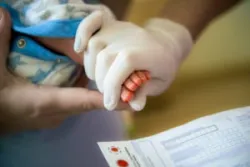
As a parent, it is understandable to worry about every bump and bruise on a newborn’s body. No parents want their child to suffer, making the appearance of a bruise a matter of concern. For the most part, minor bruising among newborns is common. Some of those cases of bruising occur as the result of a blood disorder.
While a blood disorder can cause infant bruising, it is not inherently dangerous on its own. That said, this bruising could be evidence of a dangerous medical condition that requires immediate treatment. Do not hesitate to seek medical consultation for any bruising your infant may experience. If your child’s bruising results due to the negligence of a doctor or other medical professional, a personal injury lawyer can review your case right away.
Blood Disorders that Cause Bruising Among Infants
There are multiple blood disorders that could result in bruising for an infant. Not only can some of these conditions cause bruising, they can also increase the severity and recovery time for bruises caused by some form of trauma. Some common examples of these blood disorders include:
- Von Willebrand Disease. Von Willebrand Disease is a common form of blood-clotting disorder. It is typically hereditary, meaning a child can develop it from his or her parents. The condition is generally not serious, mostly causing bruising and minor nosebleeds with infants.
- Thrombocytopenia. This condition results from abnormal levels of platelets within the blood. Infants with thrombocytopenia often have a platelet count one-third of what a child without the disease might have.
- Hemophilia. Hemophilia is an inherited blood disorder that prevents the blood from clotting properly. Infants with this condition can have frequent bruising as well as difficulty stopping a wound from bleeding.
- Infant Leukemia. Leukemia among infants is rare, but it can have devastating health effects. One of the symptoms of this disease is frequent bruising.
Although each of these disorders impacts the body in different ways, they can each result in bruising for infants in the days and weeks after their birth. In some cases, bruising can bring these conditions to the attention of the infant’s doctors. In other cases, the bruising can indicate that the child suffered some form of physical trauma during birth.
"If your child was born with a birth injury, or cerebral palsy, we can help."
Is Bruising from a Blood Disorder Dangerous?
The bruising caused by a blood disorder is not inherently dangerous. In most cases, an infant’s body will reabsorb the blood, causing the bruising to disappear. While the bruising itself does not represent a serious threat to a child’s health, it could be an indicator of an undiscovered medical condition. In cases like infant leukemia, these conditions can have severe health implications for a child.
Thanks to modern testing, it is likely that the infant’s doctors will discover the presence of these conditions before the bruising brings them to light. Leukemia and hemophilia will also typically have a multitude of other symptoms, meaning your child will likely receive a diagnosis before bruising becomes an issue.
Other Causes of Bruising Among Infants
Blood disorders are only one potential cause of bruising among infants. Unfortunately, many of the other causes of these injuries result from the negligence of another person. Bumps and falls routinely lead to bruising for an infant, along with the potential for more severe injuries.
Arguably, the most common cause of infant bruising is injuries that occur due to birth trauma. Some minor bruising during the birth process is normal, given the amount of force the infant experiences. A difficult or stalled delivery often requires the use of forceps or other measures to deliver the baby.
The longer a delivery takes, the more likely this bruising can become significant. This danger is due in part to the lack of amniotic fluid protecting the baby. Negligence can occur under any of these circumstances, especially in high-stress situations. A mistake by a doctor during the delivery process could result in severe bruising, especially through the use of forceps or vacuum suction.
"We know first-hand what you are going through."
You Could Be Entitled to Compensation for Your Infant’s Bruising Claims
While a blood disorder can result in infant bruising, these conditions are responsible for only a small number of cases of bruising. By and large, physical trauma to the child caused during birth is a more likely culprit.
Never make assumptions about how your child’s bruising occurred. It is possible for your child to have suffered bruising from physical trauma even if they also suffer from a blood disorder. Discuss your legal options during a free consultation with the Birth Injury Lawyers right away by calling (800) 222-9529.
"We are committed to helping families who have suffered medical negligence."

